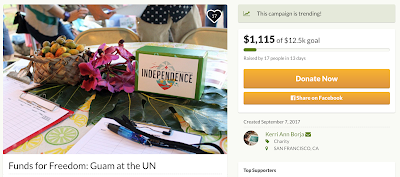IG November GA 2019
Independent Guåhan to discuss veteran’s issues and decolonization and honor the late Tony “Submariner” Artero For Immediate Release, November 24, 2019- Independent Guåhan (IG) invites the public to attend their upcoming General Assembly (GA) to take place on Thursday, December 5th from 6:00-7:30 pm at the Main Pavilion of the Chamorro Village in Hagåtña. For this GA, the group will honor as Maga’taotao the late Tony “Submariner” Artero, who was a US Navy veteran and also a strong community activist in pushing for political status change in Guam. In honor of Veteran’s Day, this GA will also feature an educational discussion on the voices of Chamoru veterans and decolonization. Tony Artero was a veteran, a war survivor and an entrepreneur, who was part of the Artero family that helped hide US Navyman George Tweed during the Japanese occupation of Guam. Although his father received the Congressional Medal of Freedom for the risks he took, soon after the US military condemned







